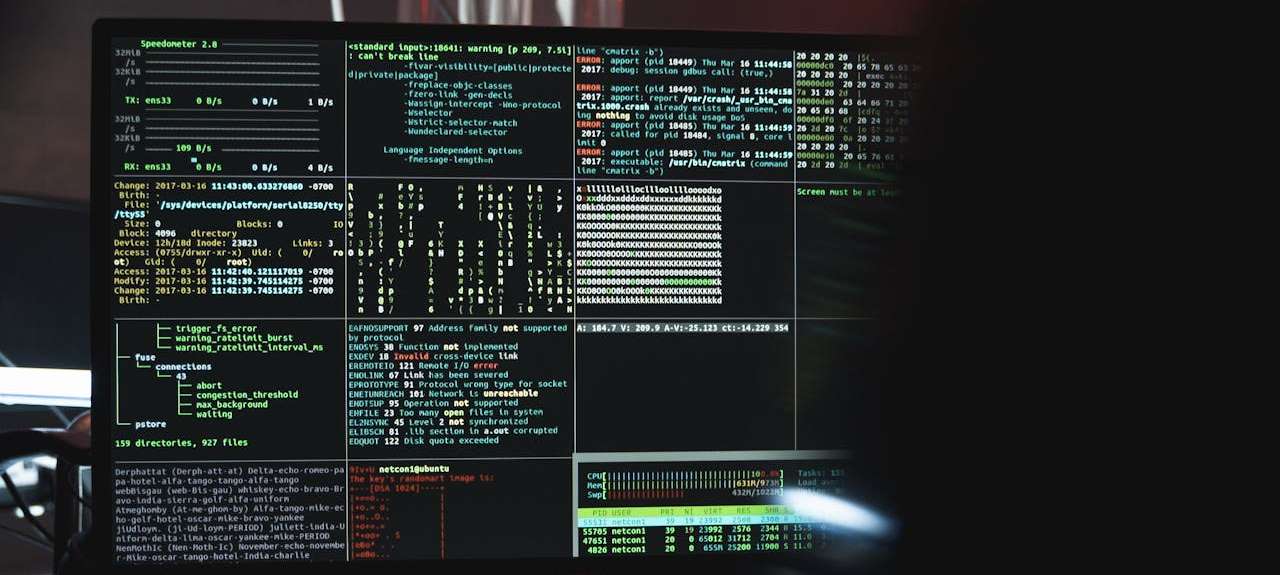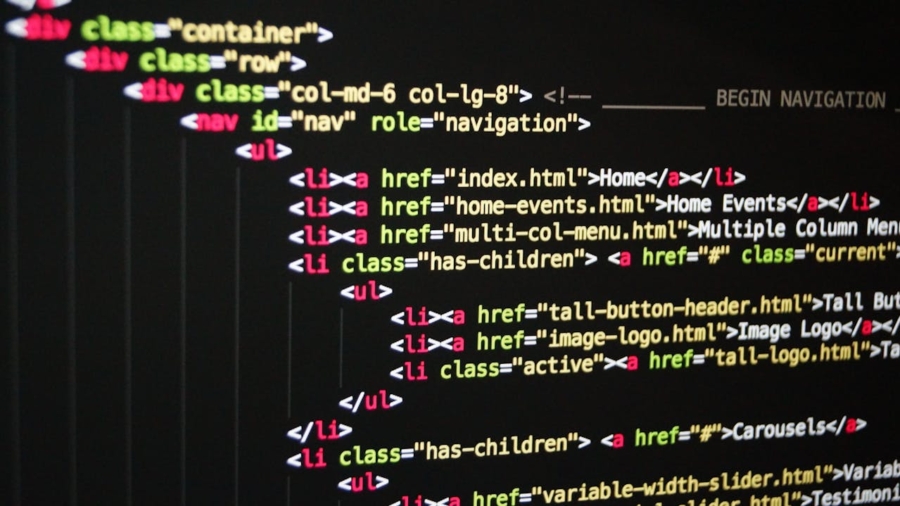The demand for skilled programmers is reaching unprecedented heights. According to the U.S. Bureau of Labor Statistics, the employment of computer and information technology professionals is projected to grow faster than the average for all occupations with about 356,700 new openings each year from 2023 to 2033, far outpacing most other fields.
This surge is fueled by the increasing reliance on technology across industries, from healthcare to finance to entertainment. As companies race to adopt new technologies and optimize their operations, the need for talented programmers has become a priority.
Programming forms the backbone of modern technology. From building software applications and developing websites to automating tasks and analyzing data, programming skills empower individuals to create solutions, drive innovation, and stay competitive in a tech-driven world. Moreover, with remote work and freelancing becoming more mainstream, programming expertise can open up flexible career opportunities with high earning potential.
But with so many resources available online, it can be overwhelming to figure out where to start. That’s why we’ve curated this list of top programming courses to kickstart your career in tech, designed to suit a variety of needs, whether you’re a complete beginner, a self-taught programmer looking to refine your skills, or an experienced professional eager to specialize in a new area.
In this blog, we’ll explore the best programming courses for a career in tech, that not only teach you how to code but also equip you with the practical skills needed to succeed in the ever-evolving tech industry. Let’s embark on this journey together!
Why Learning Programming is Essential for a Tech Career
Industry Demand
The digital transformation of businesses and industries worldwide has created a booming demand for tech talent, especially programmers. From developing mobile apps to designing complex cloud infrastructures, companies across all sectors are on the lookout for skilled professionals who can help them stay competitive in an increasingly digital world.
In fact, technology is no longer just a supporting function in businesses, it’s central to their operations and growth. Industries like healthcare rely on software for patient management and telemedicine, finance uses complex algorithms for risk analysis and fraud detection, and entertainment platforms depend on programming to enhance user experience through streaming services, video games, and interactive media.
The rise of automation, cloud computing, and the Internet of Things (IoT) is only fueling this demand, ensuring that the need for programmers will continue to surge in the coming years. The tech industry is one of the fastest-growing sectors globally, and this growth is driven by the need for more software development, cybersecurity, and data management.
Versatility
One of the most attractive aspects of learning programming is its versatility. It provides you with the tools to pursue a wide range of careers in the tech world, all of which are interconnected but have unique focuses.
For instance, if you’re drawn to the creative side of technology, you could focus on front-end development, where your coding skills will be used to build interactive, visually appealing websites and apps. On the other hand, if you enjoy problem solving and system architecture, back-end development might be more suited to you, as it involves designing the server-side logic that powers applications.
Fields like artificial intelligence (AI) and machine learning (ML) offer exciting career prospects, as these areas rely heavily on programming to create intelligent systems capable of processing and learning from data. For those interested in the security aspects of technology, programming skills are essential in cybersecurity roles, where the ability to understand code helps identify vulnerabilities and develop protective measures.

Career Growth
The benefits of learning programming extend far beyond job opportunities, they also include substantial career growth potential. The tech industry is known for offering fast career advancement, and having programming expertise puts you on the fast track to leadership positions. Whether you’re looking to become a software architect, a chief technology officer (CTO), or an AI specialist, the foundation of your career is built on strong programming knowledge. The beauty of programming is that it not only allows you to solve technical problems but also gives you the ability to innovate and drive change in organizations, making you a key player in any team.
4. High Earning Potential
In addition to career growth, programming offers lucrative salaries. The tech industry is known for its high-paying positions, and having programming skills can significantly increase your earning potential. For example, software engineers, machine learning engineers, and data scientists all command six-figure salaries, with senior roles reaching even higher.
According to Glassdoor, the average base salary for a software engineer in the U.S. is around $162,000 annually, with top companies offering even higher compensation packages. In fact, many tech giants like Google, Amazon, and Microsoft offer competitive salaries, bonuses, and stock options that make tech roles some of the highest paying in the market.
5. Flexibility and Remote Opportunities
Another major advantage of learning programming is the flexibility it offers in terms of work environment. Many tech companies offer remote or hybrid work arrangements, allowing you to work from anywhere in the world.
This flexibility is especially valuable in today’s fast-paced world, where work life balance has become a priority for many employees. By learning programming, you can work for top tech companies without having to relocate or adhere to traditional office hours.
This opens up opportunities to work with global teams, gain diverse perspectives, and potentially travel while still maintaining a successful career. The COVID-19 pandemic has accelerated the trend of remote work, and tech roles have led the way in offering flexible work options.
6. Job Security and Stability
The tech industry is one of the few sectors that has demonstrated resilience even during economic downturns. While other industries may be vulnerable to fluctuations in the market, tech companies continue to thrive as businesses and consumers rely more heavily on technology.
Programmers with in-demand skills like cloud computing, cybersecurity, and artificial intelligence are especially sought after, which provides job security in an ever changing economy.
7. Contribution to Innovation and Society
Learning programming allows you to be part of something much bigger than yourself. As a programmer, you have the opportunity to work on projects that shape the future, whether it’s creating software that solves real world problems, designing apps that improve people’s lives, or developing systems that drive advancements in science and medicine.
Many of the world’s most significant innovations, from life saving medical technologies to breakthroughs in renewable energy, are powered by programming. By mastering this skill, you position yourself as a creator of change, contributing to the development of solutions that impact not only industries but society as a whole.

Factors to Consider When Choosing a Programming Course
1. Relevance to Career Goals
One of the first things to consider when choosing a programming course is how it aligns with your career aspirations. Different areas of tech require different skill sets, and not all programming languages or courses will suit every career path.
For example, if you’re aiming to become a web developer, you’ll want to focus on courses that teach languages like HTML, CSS, JavaScript, and frameworks like React or Angular.
For a career in data science, you’ll need courses focused on languages like Python or R, along with knowledge of SQL and tools like Pandas and NumPy. Similarly, those interested in artificial intelligence should look for courses that cover machine learning, neural networks, and frameworks like TensorFlow or PyTorch.
By selecting a course that is directly aligned with your career goals, you ensure that you’re gaining the most relevant and applicable knowledge to help you succeed in your chosen field.
2. Course Format
The format of the course is another crucial factor to consider. Online courses have become the go to option for many learners, offering flexibility and convenience. They are perfect for individuals who prefer to learn at their own pace, balancing their studies with other commitments. Many online platforms also offer a wide range of courses, from introductory programming to advanced topics, allowing learners to progress as they gain confidence.
However, in-person courses can provide a more structured learning environment, with opportunities for direct interaction with instructors and peers. This is ideal for those who prefer a more hands-on approach and thrive in a classroom setting. Some learners find that the social aspect and immediate feedback from instructors help them stay motivated and engaged.
Within online courses, you’ll often have the option to choose between self-paced or instructor-led formats. Self-paced courses allow you to progress at your own speed, giving you the flexibility to dedicate as much time as you need.
On the other hand, instructor-led courses provide more structure, deadlines, and interaction, which can help ensure accountability and keep you on track. When choosing a format, consider your learning style, schedule, and whether you need the additional support of a structured classroom environment.
3. Certification
While not always essential, a recognized certification can be a powerful asset in boosting your employability. Certifications from reputable platforms or organizations can validate your skills and demonstrate your commitment to learning.
For example, a certification from platforms like Coursera, edX, or Udacity can show potential employers that you’ve gained knowledge in a specific area of programming and have met certain industry standards. Some courses, especially those affiliated with universities or major tech companies, offer certifications that are highly regarded in the job market.
However, it’s important to note that while certifications can enhance your resume, they aren’t the only factor employers look for. Practical experience, a solid portfolio, and your ability to demonstrate problem solving skills are equally important.
If you’re learning for personal development or a specific project, a certification may not be necessary, but if you’re looking to boost your career prospects, it’s worth considering a course that offers a credential.

4. Cost and Accessibility
When choosing a programming course, cost is an essential factor. While some of the best programming courses can be pricey, there are also a number of budget friendly or even free options available for learners. Platforms like Codecademy, freeCodeCamp, and Khan Academy offer excellent introductory programming courses for free, allowing you to learn the basics without committing to a significant financial investment.
For more advanced topics, platforms like Udemy and Coursera often offer affordable courses, especially during sales or promotions.
Some coding boot camps and university programs offer scholarships or financial aid to make learning more accessible. It’s important to evaluate the value of the course against its cost, taking into consideration the quality of the content, the reputation of the provider, and whether the course offers a recognized credential.
Remember that free resources can be just as effective for self-motivated learners, but they may require more discipline and time management compared to paid, structured programs.
5. Reputation and Reviews
The reputation of the course provider plays a significant role in ensuring the quality of your education. Courses from well established platforms or institutions are likely to offer more reliable and up-to-date content. It’s important to check reviews and testimonials from previous students to get an idea of the course’s strengths and weaknesses.
Sites like Course Report and Trustpilot often feature user reviews that can provide insights into the course experience. You can also find reviews on Reddit or LinkedIn to see how others have applied the knowledge they gained and whether it helped them in their career. A well reviewed course that’s updated regularly will give you the confidence that you’re learning the most current and relevant programming skills.
6. Practical Projects and Hands-On Learning
The most effective way to solidify your programming knowledge is through hands-on experience. Courses that offer practical projects or coding exercises give you the opportunity to apply what you’ve learned in real-world scenarios.
Look for courses that include assignments, capstone projects, or even internship opportunities where you can work on actual coding problems. These projects help you build a portfolio, which is essential when seeking employment or freelance work.
Employers often look for candidates who can demonstrate their ability to solve real-world problems through coding, and having a portfolio of projects is a great way to show your practical skills.
7. Community and Support
A strong community and support network can greatly enhance your learning experience. Look for courses that offer access to discussion forums, peer support, or mentorship. Platforms like Stack Overflow, Reddit, or specific course forums can provide you with a place to ask questions, share ideas, and learn from others.
Some platforms also offer one-on-one mentorship, where you can receive personalized guidance from experienced professionals. The ability to get feedback, ask questions, and collaborate with other learners can significantly improve your understanding of programming concepts and keep you motivated throughout the course.
Choosing the right programming course is crucial to achieving your career goals and mastering new skills. By considering factors mentioned above, you can ensure that you’re making an informed decision.
Whether you choose a free online course or invest in a full-fledged boot camp, the most important thing is to stay committed to your learning journey and apply your knowledge in practical ways. With the right course, you’ll be well on your way to mastering programming and advancing your career in the tech industry.

Top Programming Courses for Beginners
1. Coursera: Python for Everybody by University of Michigan
One of the best programming courses for beginners is “Python for Everybody” offered by the University of Michigan on Coursera. Python is known for its readability and simplicity, making it an ideal language for those just starting their programming journey. This course is designed for absolute beginners and doesn’t assume any prior programming knowledge, making it accessible to anyone eager to learn.
The course covers the fundamentals of Python, including variables, loops, functions, and data structures like lists and dictionaries. It also introduces key concepts like web scraping, working with databases, and using Python to interact with APIs, giving you practical tools to work with real-world data.
One of the highlights of this course is its beginner friendly approach, breaking down complex topics into manageable chunks and offering hands-on practice through coding exercises and quizzes. The course’s clear structure and interactive nature make it a great choice for those who want to learn programming at their own pace.
Upon completing the course, you’ll receive a certificate that can help you demonstrate your newly acquired Python skills to potential employers, adding value to your resume. If you’re looking for a well-structured, easy-to-follow course to kickstart your programming journey, Python for Everybody is a top choice.
2. edX: CS50’s Introduction to Computer Science by Harvard University
If you’re looking for a course that offers a deep dive into computer science concepts while still being accessible to beginners, CS50’s Introduction to Computer Science by Harvard University on edX is an excellent option. This course is one of the most well known and highly respected in the field, with a reputation for providing a comprehensive and challenging introduction to the world of computer science.
The course covers a wide range of topics, from basic programming and algorithms to more advanced concepts like data structures, web development, and even an introduction to artificial intelligence. It teaches languages such as C, Python, and SQL, offering a well rounded foundation in computer science that is applicable across various tech fields.
While the course is more intensive than some beginner courses, it is designed in such a way that even newcomers to programming can follow along. It’s packed with engaging lectures, problem sets, and hands-on projects that help solidify the concepts. The course also offers a certificate of completion, which is highly valued in the tech industry.
If you’re serious about building a strong foundation in computer science and programming, CS50 provides an immersive and comprehensive experience, and its global reputation adds credibility to the skills you’ll gain.
3. freeCodeCamp: Responsive Web Design
For those specifically interested in web development, freeCodeCamp’s Responsive Web Design course is a fantastic option for absolute beginners. The course focuses on HTML, CSS, and the principles of responsive design, making it perfect for learners who want to create websites that look great on all devices.
One of the key features of this course is its hands-on project based learning. Throughout the course, you’ll work on real-world projects, such as building personal portfolios and designing fully responsive websites. This allows you to not only learn the core concepts of web development but also to build a tangible portfolio of work that you can showcase to potential employers.
The course is completely free and self-paced, making it an accessible option for anyone, regardless of budget or location. FreeCodeCamp’s community driven approach also means that you’ll have access to a vast network of fellow learners and mentors, providing additional support as you progress through the course. Whether you’re a high school student, a career changer, or someone simply interested in learning how to design websites, Responsive Web Design offers a practical and engaging introduction to web development.
4. Udemy: The Complete Web Developer Bootcamp 2023
If you’re interested in a full-stack web development course, Udemy’s “The Complete Web Developer Bootcamp 2023” is one of the best comprehensive options available for beginners. This course, taught by Colt Steele, covers HTML, CSS, JavaScript, Node.js, Express, MongoDB, and React, making it an excellent all-in-one training for aspiring web developers.
What sets this course apart is its hands-on approach, with numerous projects that help you practice what you’ve learned. By the end of the course, you’ll have built several real-world applications, including a blog, a weather app, and a full-stack application, all of which are great additions to your portfolio.
The course is also affordable (especially with Udemy’s frequent discounts) and is self-paced, allowing you to learn at your convenience. With lifetime access to the course materials, you can revisit content as you progress in your career. The course also offers a certificate of completion that can be shared with potential employers.
For those who want a comprehensive, project-driven web development bootcamp, this course provides an in-depth and structured path to becoming a full-stack developer.
5. Codecademy: Learn JavaScript
For those interested in learning JavaScript, Codecademy’s Learn JavaScript course is an excellent interactive option. JavaScript is one of the most widely used programming languages, especially for web development, and Codecademy’s course offers a beginner-friendly introduction.
The course covers core JavaScript concepts such as variables, loops, functions, and objects, while also diving into more advanced topics like DOM manipulation and asynchronous JavaScript. Codecademy’s platform is highly interactive, allowing you to write and test code directly in your browser, which makes learning more engaging and hands-on.
Codecademy’s learning environment also offers immediate feedback, so you can correct mistakes as you go. This feature is particularly helpful for beginners, as it helps you stay on track and avoid developing bad habits. The course is available for free, with additional features available through Codecademy Pro, including quizzes, projects, and personalized learning.
Choosing the right course is key to getting started in programming, and each of these options offers unique benefits depending on your interests. No matter which path you choose, these courses offer valuable learning opportunities that can help you start your programming journey with confidence.

Specialized Online Programming Courses for Advanced Learners
1. Udemy: The Complete JavaScript Course 2023 by Jonas Schmedtmann
For advanced learners who are already comfortable with the basics of JavaScript, “The Complete JavaScript Course 2023” by Jonas Schmedtmann on Udemy offers an in-depth exploration of modern JavaScript techniques. This course is designed for developers who want to take their JavaScript skills to the next level by learning advanced concepts such as ES6+ features, asynchronous programming, JavaScript frameworks, and functional programming.
The course dives into topics like promises, async/await, closure, and event delegation, providing learners with the knowledge to write clean, efficient, and scalable code. It also covers object oriented programming (OOP) and JavaScript design patterns, which are essential for creating more complex and maintainable applications.
What makes this course particularly valuable is its real world project approach. You’ll build several fully functional projects, including a bankist app, a weather app, and a mapty app, each of which applies modern JavaScript concepts to solve practical problems. These projects will help you build a portfolio that demonstrates your ability to work with real world JavaScript challenges.
The course also focuses on best practices and performance optimization, which are crucial for writing production-level code. By the end of this course, you’ll have a comprehensive understanding of modern JavaScript and the skills to develop complex applications.
2. DataCamp: Data Scientist with Python Career Track
If you’re looking to specialize in data science or analytics, DataCamp’s Data Scientist with Python Career Track is an excellent choice. This comprehensive program is designed to provide advanced learners with the tools and knowledge necessary to work with large datasets, perform statistical analysis, and develop machine learning models using Python.
The career track covers essential Python libraries like Pandas, NumPy, Matplotlib, and Seaborn, allowing you to manipulate and visualize data with ease. It also dives deep into machine learning concepts using scikit-learn, teaching you how to build models for classification, regression, and clustering.
Advanced topics like natural language processing (NLP), deep learning, and time series analysis are also included, making it an ideal choice for those who want to dive into specialized fields within data science.
One of the standout features of this career track is its focus on hands-on learning. Each module is accompanied by interactive exercises and real-world projects that allow you to apply what you’ve learned to solve actual data science problems. The career track also includes quizzes and projects that help you build a strong portfolio to showcase your skills to potential employers.
By the end of the course, you’ll have developed the expertise needed to become a proficient data scientist, with the ability to analyze and model data effectively and make data-driven decisions. This track is ideal for learners who already have some programming knowledge and want to specialize in data science.
3. Pluralsight: Advanced C# Programming
For experienced developers looking to master C# and take their skills to the next level, Pluralsight’s Advanced C# Programming course is a fantastic resource. This course is specifically designed for developers who already have a solid understanding of C# and want to explore advanced features and concepts within the language.
The course covers a wide range of advanced topics, including delegates, events, LINQ, asynchronous programming, and advanced object-oriented programming (OOP) concepts like inheritance, polymorphism, and dependency injection. These topics are essential for creating efficient, maintainable, and scalable applications in C#.
In addition to core language features, the course also delves into design patterns and best practices that are commonly used in C# development. It covers topics like SOLID principles, refactoring, and unit testing, which are crucial for writing high-quality, production-ready code.
One of the benefits of this course is that it’s taught by industry experts, so you’ll gain insights from experienced developers who have worked on real-world C# projects. The course is project-based, allowing you to apply advanced concepts to practical applications, and it includes hands-on coding exercises to reinforce your learning.
This course is perfect for developers who already have a good understanding of C# and want to deepen their expertise, improve their coding practices, and tackle more complex challenges in the language.
4. Udacity: AI Programming with Python Nanodegree
For those looking to dive into the field of artificial intelligence (AI) and machine learning (ML), Udacity’s AI Programming with Python Nanodegree is an excellent choice. This program is designed for intermediate to advanced learners who want to master the core skills needed to work in AI and ML.
The course covers essential tools like Python, NumPy, Pandas, Matplotlib, and PyTorch, and teaches learners how to build AI-powered applications. You’ll work on real-world projects such as building neural networks, training models, and working with large datasets. The curriculum includes deep dives into topics like supervised learning, unsupervised learning, deep learning, and computer vision.
This course is project-based, and learners will create applications that demonstrate their ability to solve real-world AI problems. Udacity’s Nanodegrees are well-known for their high quality and focus on practical skills, making this an excellent choice for those aiming for a career in AI or ML.
5. MIT OpenCourseWare: Advanced Data Structures
If you are looking to further your understanding of data structures and algorithms, MIT’s Advanced Data Structures course is a great choice. Available for free through MIT OpenCourseWare, this course offers an in-depth exploration of advanced data structures such as graphs, tries, segment trees, and advanced tree structures.
The course is designed for learners who already have a solid understanding of basic data structures like arrays, linked lists, and binary trees. It goes beyond basic theory and focuses on the practical application of these structures in solving complex algorithmic problems. By mastering these advanced structures, you will be able to tackle more sophisticated computational challenges and improve your problem solving skills.
MIT’s reputation for excellence in computer science ensures that this course provides rigorous, high quality content. It’s perfect for learners who want to deepen their theoretical understanding and develop strong algorithmic skills.
6. LinkedIn Learning: Advanced Python
For Python developers who are already familiar with the basics, LinkedIn Learning’s Advanced Python course offers a more in-depth exploration of the language. This course focuses on advanced Python concepts such as decorators, metaclasses, generators, and context managers.
The course also delves into best practices for writing efficient, clean, and maintainable Python code, with a focus on object-oriented programming (OOP) and functional programming. Advanced topics like multithreading, multiprocessing, and async programming are also covered, giving learners the skills needed to write highly efficient Python applications.
LinkedIn Learning is known for its high-quality video tutorials and offers learners access to a variety of additional resources, including quizzes, exercise files, and practical examples. This course is perfect for experienced Python developers who want to enhance their expertise and write more sophisticated, performance-optimized Python code.
7. Treehouse: Full Stack JavaScript Track
For learners who are focused on full stack JavaScript development, Treehouse’s Full Stack JavaScript Track is a comprehensive learning path that covers both front-end and back-end development. The course starts with JavaScript fundamentals and moves into more advanced topics like Node.js, Express, and MongoDB for server side programming.
Treehouse also offers modules on building interactive front-end applications using React and Vue.js, allowing learners to become proficient in both client-side and server-side JavaScript. The course includes hands-on projects where learners build applications like task managers, real-time chat apps, and web services, providing a practical approach to full-stack development.
With a strong emphasis on best practices and real-world coding skills, Treehouse’s Full Stack JavaScript Track is perfect for developers who want to build a well-rounded skill set in JavaScript and web development.
Other specialized courses like MIT’s Advanced Data Structures, LinkedIn Learning’s Advanced Python, and Kaggle’s Data Science challenges provide additional opportunities to refine your skills in specific areas. Whether you’re looking to specialize in full-stack JavaScript development, data science, or AI, there’s a course that will meet your learning needs and help you advance your career.

Free Programming Courses
1. Khan Academy: Basics of Programming and Computer Science
Khan Academy is an excellent free resource for beginners who are just starting to learn programming and computer science. It offers a series of interactive courses that cover the basics of programming and computer science. These courses are perfect for those who want to understand core programming concepts in a visual and interactive format.
Khan Academy’s Programming Fundamentals course introduces key concepts such as variables, loops, functions, and conditionals. The course also covers JavaScript and HTML/CSS, making it ideal for beginners who want to learn how to create websites and basic interactive programs.
2. LeetCode and HackerRank: Platforms for Practicing Coding Challenges
When it comes to improving your problem-solving skills and preparing for coding interviews, LeetCode and HackerRank are two of the best free platforms available. These websites offer a wide range of coding challenges that cover topics such as data structures, algorithms, dynamic programming, and system design.
LeetCode is particularly known for its extensive collection of problems, which range from easy to advanced. It also includes coding challenges that mirror the types of questions asked in top tech company interviews, making it an invaluable resource for job seekers.
With its premium subscription, you can access additional problems and solutions, but there are plenty of free challenges available to get started. The platform allows you to practice coding in multiple languages like Python, Java, C++, and JavaScript, making it versatile for learners of different backgrounds.
Similarly, HackerRank provides coding challenges and contests in a wide range of domains such as algorithms, data structures, mathematics, and even AI. The platform is well-known for its structured learning paths, which guide you through various problem sets to help you gradually improve your skills. HackerRank also offers certifications that you can share with employers to demonstrate your proficiency in different areas.
Both platforms foster a competitive yet supportive community where learners can share solutions, discuss approaches, and improve together. If you’re serious about enhancing your coding skills and preparing for interviews, LeetCode and HackerRank should be an essential part of your learning toolkit.
3. GitHub: A Hub for Exploring Open Source Projects and Collaborative Learning
GitHub is a powerful platform that not only allows you to store and manage your code but also gives you access to a vast ecosystem of open-source projects. If you want to take your programming skills to the next level, contributing to open-source projects is one of the best ways to gain real-world experience and collaborate with other developers.
By exploring projects on GitHub, you can learn from other developers’ code, see how complex applications are built, and contribute to improving those projects. It’s an excellent way to build your portfolio, especially if you’re looking to showcase your work to potential employers.
GitHub also supports a community-driven approach to learning. Many developers share their code and projects publicly, allowing others to contribute or learn from them. Whether you’re looking to contribute to a data science project, a web development app, or a machine learning model, there are endless opportunities to get involved in collaborative coding.
In addition to exploring projects, GitHub also offers features like Gists for sharing small code snippets, issues for reporting bugs or suggesting improvements, and GitHub Pages for hosting personal websites or portfolios. The platform integrates well with other development tools and allows you to practice version control, which is an essential skill for professional developers.
4. freeCodeCamp: Free Full-Stack Development Curriculum
freeCodeCamp is one of the most popular free programming resources, offering a comprehensive curriculum that covers front-end and back-end web development. It’s perfect for learners who want to become full-stack developers. The curriculum is divided into various sections, including HTML, CSS, JavaScript, React, Node.js, Express, and MongoDB, making it an ideal choice for those interested in web development.
One of the standout features of freeCodeCamp is its project-based learning approach. Instead of just watching tutorials, you will be building real-world applications as you progress through the curriculum. This includes projects like a portfolio website, a markdown editor, and a weather app. Completing these projects gives you a strong portfolio to showcase to potential employers.
freeCodeCamp also offers a strong community where learners can connect, collaborate, and support each other. You can join the community forums, participate in challenges, and ask for help when needed. Additionally, freeCodeCamp is completely free and doesn’t require any payment for certification, making it an excellent choice for learners on a budget.
5. The Odin Project: Full-Stack Web Development
The Odin Project is another free resource that offers a full-stack web development curriculum. It’s ideal for learners who want a structured path to becoming a web developer. The Odin Project covers all aspects of web development, including HTML, CSS, JavaScript, Git, Node.js, and React, and includes extensive modules on both front-end and back-end development.
What sets The Odin Project apart is its project-based learning approach, similar to freeCodeCamp. Throughout the course, learners will build real-world projects, including a multi-page website, a JavaScript calculator, and a full-stack web application. The platform emphasizes the importance of hands-on experience and collaboration, which is essential for developing the skills needed to become a successful web developer.
The Odin Project is completely free and open-source, and its community is active and supportive. It’s an excellent option for learners who want to gain comprehensive web development skills without spending money on expensive courses.
6. Exercism: Programming Practice with Mentorship
If you’re looking for a resource that combines coding practice with mentorship, Exercism is a great platform. Exercism provides coding exercises in over 50 programming languages, from Python and JavaScript to Ruby and Go. Each exercise is designed to help you practice specific coding skills and improve your understanding of different languages.
What makes Exercism unique is its mentorship feature. After you submit a solution to an exercise, an experienced mentor will review your code and provide feedback. This personalized feedback helps you learn best practices, identify areas for improvement, and avoid common mistakes.
Exercism is ideal for learners who want to focus on specific programming languages or improve their coding techniques. The platform is free, and the mentorship is an invaluable resource for those who want to receive guidance from seasoned developers.

Tips for Maximizing Your Programming Experience
1. Set Clear Goals
Before diving into any course or learning resource, it’s essential to set clear, specific goals. Ask yourself what you hope to achieve from the course. Are you learning to build web applications, prepare for coding interviews, or explore data science? Knowing your objectives will help you stay focused and motivated.
For example, if you’re learning Python for data analysis, your goal might be to complete a project where you analyze real-world data using libraries like Pandas and Matplotlib. If you’re learning JavaScript for web development, your goal might be to build a fully functional website. Break down your long-term goal into smaller, actionable steps, and track your progress regularly. This approach will keep you on track and help you avoid feeling overwhelmed.
2. Practice Regularly
One of the most effective ways to solidify your learning is by practicing regularly. Programming is a skill that improves with consistent practice, so it’s essential to apply what you’ve learned by building real-world projects. For example, after learning the basics of HTML and CSS, you could create a personal website or a portfolio. If you’re learning JavaScript, consider building interactive elements, like a to-do list or a weather app.
Even if you don’t have a project idea in mind, there are countless coding challenges on platforms like LeetCode, HackerRank, and Exercism to help you practice problem-solving skills. These platforms offer problems in various difficulty levels, allowing you to gradually progress from beginner to advanced challenges. The more you practice, the more confident you will become in your abilities.
3. Join Communities
Learning programming can be a solitary journey, but it doesn’t have to be. Joining programming communities is an excellent way to stay motivated, ask questions, and receive feedback on your work. Communities like Stack Overflow, Reddit’s r/learnprogramming, and Dev.to are full of developers who are happy to help and offer advice. You can also find specialized forums for particular technologies, such as Python, JavaScript, or web development.
In addition to online forums, consider joining local meetups, coding boot camps, or hackathons to connect with other learners and professionals in the tech industry. These events provide opportunities for networking, collaboration, and mentorship, which can significantly accelerate your learning process. Sharing your experiences and learning from others is invaluable, as it exposes you to different problem-solving approaches and best practices.
4. Focus on Understanding Concepts, Not Just Memorizing Code
While it’s tempting to memorize code snippets or solutions, true mastery comes from understanding the underlying concepts. Instead of simply memorizing how to solve a specific problem, take the time to understand why a particular approach works and how it can be applied in different situations.
For example, when learning algorithms, focus on the logic behind the algorithm rather than just memorizing the code. Try to explain the steps in your own words and consider how the algorithm can be optimized or modified for different use cases. This deep understanding will help you think critically when solving new problems, and it will make learning more enjoyable and rewarding.
5. Stay Consistent and Be Patient with Yourself
Learning to code takes time and persistence, and it’s essential to be patient with yourself. Some concepts might be challenging, and progress may seem slow at times. However, consistency is key. Set aside dedicated time each day or week for learning and practicing programming. Even 30 minutes of focused study per day can lead to significant progress over time.
It’s also important to celebrate small victories along the way. Whether you’ve completed a course, solved a tricky coding challenge, or built a simple project, take pride in your accomplishments. This will help you stay motivated and build momentum for tackling more complex problems.
6. Utilize Interactive Tools and Platforms
To maximize your learning, consider using interactive coding platforms like Codecademy, Exercism, and Khan Academy, which allow you to write code directly in your browser. These platforms provide immediate feedback on your solutions, helping you correct mistakes and improve faster. Many of them offer step-by-step guidance, which is particularly helpful for beginners.
Additionally, IDE (Integrated Development Environment) tools like VS Code and PyCharm can help streamline your coding workflow. They provide helpful features like auto-completion, syntax highlighting, and error detection, which can save you time and help you focus on learning.

7. Teach What You Learn
One of the best ways to solidify your understanding of a topic is by teaching it to others. Whether it’s through writing blog posts, creating tutorials, or explaining concepts to friends or peers, teaching forces you to clarify your understanding and identify gaps in your knowledge. You can even record videos or create content on platforms like YouTube or Medium to share your learning journey and help others.
Explaining difficult concepts to someone else can also reinforce your learning and provide a sense of accomplishment. Plus, teaching is a great way to contribute to the programming community and establish yourself as someone who is knowledgeable in the field.
8. Embrace Failure and Learn from Mistakes
In programming, failure is inevitable, but it’s also a crucial part of the learning process. When you encounter bugs or errors, instead of getting discouraged, view them as learning opportunities. Debugging and problem solving are essential skills that will make you a better programmer.
If you’re stuck on an issue, take a break, look for solutions online, or ask for help in forums or communities. Often, the process of figuring out why something isn’t working can lead to a deeper understanding of the concept you’re working with. Over time, you’ll become more comfortable with failure and better equipped to handle challenges.
9. Track Your Progress and Reflect on Your Learning Journey
It’s easy to feel like you’re not making progress when you’re learning something new, but tracking your achievements can help you see how far you’ve come. Keep a learning journal where you jot down key concepts you’ve learned, challenges you’ve overcome, and milestones you’ve reached. Reflecting on your progress regularly can boost your confidence and remind you of how much you’ve accomplished.
Additionally, setting aside time for self-assessment allows you to identify areas where you need improvement. Revisit old projects or coding challenges and see if you can optimize them or apply new techniques you’ve learned. This process of continuous reflection and improvement will make you a more effective learner.
Remember, every expert programmer started as a beginner. The key is to stay curious, be consistent, and embrace the challenges along the way. As you learn and grow, you’ll gain the confidence and expertise needed to succeed in this thriving industry.
Take action today. Explore the courses listed in this post and find the one that aligns with your career goals. The tech world is waiting for your unique skills, and your first step toward success starts with a single click. Whether you’re just starting out or advancing your skills, there’s no better time than now to dive into the world of programming and set yourself up for a bright future.
Take action today. Explore the courses listed in this post and find the one that aligns with your career goals. The tech world is waiting for your unique skills, and your first step toward success starts with a single click. Whether you’re just starting out or advancing your skills, there’s no better time than now to dive into the world of programming and set yourself up for a bright future.
FAQs
Which Programming Language Should I Start With?
The best programming language to start with depends on your goals and interests. Here are some popular options:
- Python: Known for its simplicity and readability, Python is an excellent choice for beginners. It’s widely used in fields like web development, data science, machine learning, and automation. If you’re unsure where to begin, Python is a great all-around option.
- JavaScript: If you’re interested in web development, JavaScript is a must-learn language. It’s used to create interactive websites and is the foundation for front-end frameworks like React and Angular.
- Java: Java is a great language if you’re interested in building large-scale applications, mobile apps (especially Android), or enterprise software.
- C/C++: If you want to dive into system-level programming or work with embedded systems, C or C++ would be a solid choice.
Ultimately, choose a language that aligns with your interests and the career path you’re aiming for. Once you learn one language, transitioning to others becomes much easier.
How Long Does It Take to Learn Programming?
The time it takes to learn programming varies from person to person. On average, it can take anywhere from 3 to 12 months to become proficient in a programming language, depending on how much time you dedicate to learning each week. Here are some factors that influence the timeline:
Learning approach: The method you use to learn (e.g., self-paced online courses, boot camps, or university degrees) can impact how quickly you gain proficiency. More immersive, structured learning programs may expedite the process.
Prior experience: If you already have some background in logical thinking or basic computer skills, you may pick up programming faster.
Time commitment: The more time you dedicate to studying and practicing, the quicker you’ll learn. A consistent practice routine (e.g., coding for an hour every day) can speed up your progress.
Are Free Courses as Effective as Paid Ones?
Yes, free courses can be just as effective as paid ones, especially if you’re self-motivated and committed to your learning. There are numerous high-quality free resources, such as freeCodeCamp, Khan Academy, and The Odin Project, which offer comprehensive courses on web development, data science, and other fields.
However, there are a few things to keep in mind:
- Structure and guidance: Paid courses, such as those offered on Udemy or Coursera, often provide a more structured curriculum and offer additional support, like instructor feedback and mentorship.
- Certifications: Some paid courses offer recognized certificates that can enhance your resume and demonstrate your expertise to potential employers.
- Additional resources: Paid platforms may provide access to more advanced content, exclusive tutorials, and career services that can help you progress faster.
That being said, many free resources are more than enough to help you learn the basics and build foundational skills. Ultimately, your success depends more on how much time and effort you put into your learning rather than the cost of the course.
Do I Need a Computer Science Degree to Become a Programmer?
No, you don’t need a computer science degree to become a programmer. Many successful developers have learned through self-study, coding boot camps, or online courses. While a computer science degree can provide in-depth knowledge of algorithms, data structures, and computer theory, it is not a requirement to start a career in programming.
The tech industry values skills and experience over formal education, so if you can demonstrate your programming abilities through projects, certifications, and a strong portfolio, you can succeed without a degree.
How Can I Stay Motivated While Learning to Code?
Staying motivated while learning to code can be challenging, especially when you face roadblocks or complex concepts. Here are a few tips to keep you motivated:
Remember why you started: Keep your long-term goals in mind, whether it’s landing a job, building an app, or mastering a new technology.
Set small, achievable goals: Break down large projects into smaller tasks to avoid feeling overwhelmed.
Celebrate your progress: Acknowledge and celebrate your milestones, even if they seem small.
Join coding communities: Engage with others in forums, meetups, or social media groups to share your experiences and get support.
Build projects: Work on projects that interest you. When you can see the tangible results of your learning, it becomes more rewarding.
Can I Learn Programming While Working Full-Time or Studying?
Yes, you can learn programming while working or studying full-time. Many people successfully balance learning to code with other responsibilities by dedicating a specific amount of time each day or week to their learning. Even setting aside 30 minutes to an hour daily can make a significant difference over time.
Here are some tips for managing your time effectively:
- Set a routine: Establish a consistent study schedule that fits around your other commitments.
- Use bite-sized learning: Take advantage of short, interactive tutorials or coding exercises that you can complete in shorter sessions.
- Make use of idle time: Listen to programming podcasts or watch instructional videos during commutes or breaks.
Learning programming doesn’t have to be a full-time commitment, but consistency is key.
7. Should I Focus on One Language or Learn Multiple Languages?
As a beginner, it’s generally a good idea to focus on one language first. Learning one language deeply will help you understand core programming concepts like variables, loops, and functions. Once you’re comfortable with the basics, you can branch out to other languages as needed.
If you’re working on a specific project or career path (e.g., web development or data science), it’s helpful to learn languages that align with your goals. For example:
- For web development, focus on HTML, CSS, and JavaScript.
- For data science, start with Python and libraries like Pandas and NumPy.
After mastering one language, learning others becomes much easier, as many programming concepts are transferable across languages.
8. How Do I Get My First Programming Job?
Landing your first programming job can seem daunting, but it’s entirely possible with the right approach. Here are a few tips to get started:
Prepare for interviews: Practice coding challenges, problem-solving, and interview questions to build confidence.
Build a portfolio: Work on projects that showcase your skills and interests. This could be anything from a personal website to an open-source contribution.
Networking: Attend tech meetups, online communities, and coding events to connect with professionals and other learners.
Apply to internships: Internships or junior developer roles are a great way to gain practical experience and start building your professional network.


[…] Explore CS and SE courses online (Udemy, Coursera, Harvard CS50). […]
[…] Programming languages: Learning to code is a key aspect of robotics. Languages like Python and C++ are widely used because of their flexibility and efficiency. For instance, Python is often used to program Raspberry Pi robots, while C++ is preferred for real time systems like robotic arms. […]